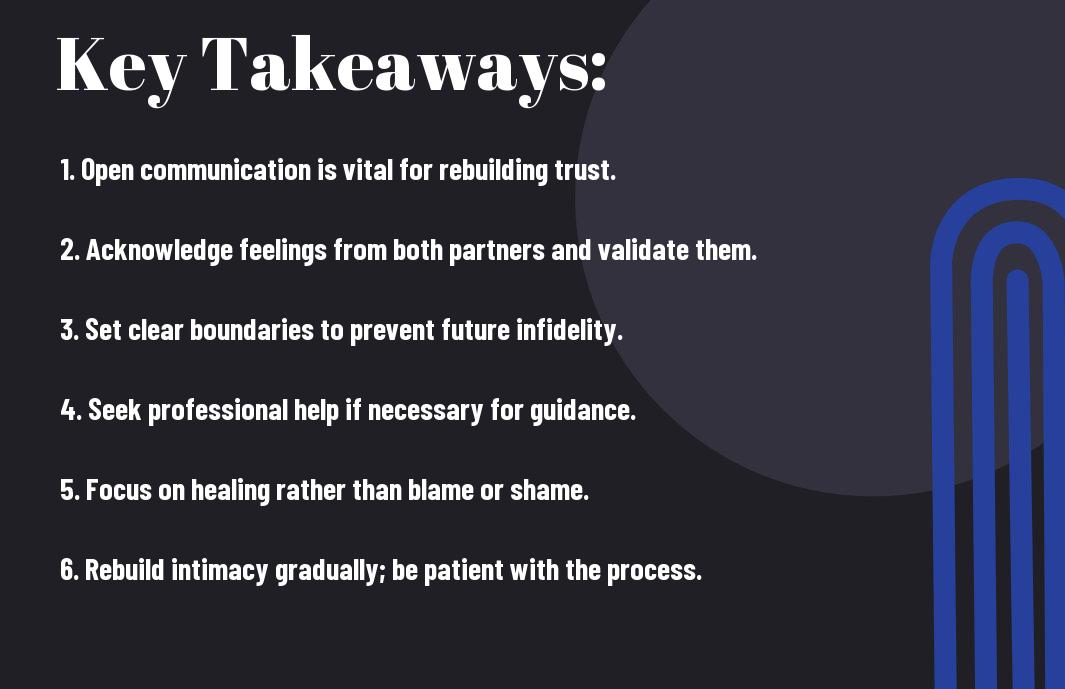Just when you thought your relationship was solid, infidelity can shake the very foundation of trust and love. If you find yourself grappling with betrayal, it’s important to understand that rebuilding your relationship is possible, but it requires effort and a genuine commitment from both partners. In this guide, you’ll discover expert advice on navigating the healing process, fostering open communication, and regaining trust, allowing you to emerge stronger and more connected than ever before. With the right steps, your relationship can evolve into a deeper bond than you thought possible.
Key Takeaways:
- Open and honest communication is vital for both partners to express feelings and concerns.
- Establish trust gradually through consistent actions and transparency over time.
- Seek professional help, such as couples therapy, to navigate emotions and learn how to effectively rebuild the relationship.
- Set clear boundaries to ensure both partners feel secure and respected during the recovery process.
- Allow for emotional healing by being patient and understanding that progress may take time.
- Engage in positive activities together to strengthen the emotional bond and create new, happy memories.
- Focus on personal growth and self-reflection, as both partners should work on individual issues that may contribute to relationship dynamics.

Understanding Infidelity
Your journey to rebuild a relationship begins with understanding what infidelity truly means. It goes beyond a physical betrayal, often entwining emotional connections and unmet needs. By delving into the reasons behind infidelity, you can better navigate the healing process and foster open communication, which is crucial for rebuilding trust.
Types of Infidelity
Your awareness of the types of infidelity can guide your understanding of betrayal. Here are some common forms:
- Emotional Infidelity
- Physical Infidelity
- Cyber Infidelity
- Situational Infidelity
- Ongoing Affairs
Knowing this helps you identify the root causes and patterns within your relationship.
| Type of Infidelity | Description |
| Emotional Infidelity | Forming a deep emotional bond outside the relationship. |
| Physical Infidelity | Engaging in sexual acts outside the partnership. |
| Cyber Infidelity | Engaging in online relationships or activities that violate trust. |
| Situational Infidelity | Betraying your partner during specific circumstances, often unexpected. |
| Ongoing Affairs | Long-term relationships outside the primary partnership. |
The Impact on Relationships
Understanding the impact of infidelity on relationships can help you navigate the complex emotions involved. It often leads to a breakdown of trust, communication barriers, and lingering feelings of betrayal. The emotional scars can run deep, making it crucial to address feelings openly and honestly. Exploring these effects is a pivotal step in the healing process.
Understanding the consequences of infidelity can shape your journey toward healing. Many couples experience heightened tension and a sense of betrayal that can linger long after the incident. It’s important to recognize that while trust has been shattered, effective communication and a willingness to work together can pave the way for reconciliation. Acknowledging the emotional turmoil and actively addressing it will guide both you and your partner toward understanding and healing. This journey may be challenging but can ultimately lead to a more resilient and authentic relationship.

Accepting the Reality
The journey to rebuild your relationship after infidelity begins with accepting the reality of what has transpired. This involves recognizing the breach of trust and the pain it has caused both partners. Acceptance does not mean condoning the betrayal; rather, it signifies facing the truth and being willing to navigate the difficult emotions that come with it. Acknowledging this reality lays the groundwork for open communication and healing in your relationship.
Acknowledging Feelings
About processing the array of emotions that arise after infidelity is vital in moving forward. You may experience anger, sadness, or confusion; it’s vital to validate these feelings rather than suppress them. Allowing yourself to feel and express these emotions fosters a deeper understanding of your inner self and helps in emotional recovery, ultimately paving the way for reconciliation.
The Importance of Honesty
Around the rebuilding process, honesty plays a significant role in restoring trust between partners. You must communicate openly about your feelings, fears, and needs to create a safe environment for healing. When both partners commit to transparency, it strengthens the foundation for forgiveness and helps to alleviate doubt and insecurity within the relationship.
But fostering honesty requires consistent effort and a willingness to confront uncomfortable truths. You should ensure both partners feel safe enough to express their thoughts without fear of judgment. This openness can lead to greater intimacy and understanding, as it allows you to tackle the root causes of the infidelity together. When you approach discussions with sincerity and vulnerability, it becomes possible to rebuild trust and work toward a healthier relationship dynamic.
Open Communication
For rebuilding trust after infidelity, open communication is crucial. You should foster an environment where both partners feel safe expressing their feelings and concerns. Honesty plays a vital role in this process, allowing you to address issues and work towards a deeper understanding of each other’s needs and emotions.
Creating Safe Spaces
Behind every successful reconnection is the ability to create safe spaces for dialogue. You need to establish zones—both physical and emotional—where you can openly share your thoughts without fear of judgement. This can be as simple as setting aside regular times to talk or finding a cozy spot in your home where you can be comfortable discussing sensitive topics.
Navigating Difficult Conversations
After infidelity, navigating difficult conversations is important for healing and growth. You must approach discussions with intention and compassion, ensuring both partners are heard and validated. This also means understanding and addressing yours and your partner’s emotions appropriately to build a stronger foundation.
Due to the sensitive nature of the topics at hand, it is crucial to approach difficult conversations with a clear plan and patience. First, choose the right time and space, free from distractions to help you communicate openly. During discussions, actively listen and validate your partner’s feelings, fostering a non-threatening atmosphere. Be honest about your feelings and experiences as well, sharing your emotions helps establish empathy and understanding between both of you. Acknowledge any anger or hurt, and don’t shy away from admitting which actions or words have affected your relationship. The goal is to move forward positively, not to rehash past grievances but to create a stronger sense of connection.
Rebuilding Trust
Now that you’ve both acknowledged the pain caused by infidelity, rebuilding trust is vital to your relationship’s recovery. This process requires patience, understanding, and a genuine commitment from both partners. You must be willing to talk openly about your feelings and fears while working together to establish a safe and secure emotional environment.
Actionable Steps for Trust Restoration
Behind the scenes of trust restoration, specific actions can significantly assist your healing journey. Start with honest conversations where you share your feelings, set clear boundaries, and define what trust means to both of you. Additionally, establish small commitments that you can consistently uphold, demonstrating reliability and accountability.
The Role of Transparency
Before you can effectively rebuild trust, embracing complete transparency is necessary. This openness allows both partners to feel secure and protected, providing the foundation to address lingering doubts and insecurities.
Due to the nature of infidelity, transparency plays a significant role in healing the emotional wounds inflicted on your partner. Sharing your thoughts, activities, and even digital communications fosters an environment of safety and openness. By being *honest* about your feelings and inviting *frank discussions*, you help dismantle the fears and uncertainties surrounding your relationship. As you strive for personal accountability, it helps to *mitigate suspicion* and *promote healing*, ultimately leading to a deeper, more trusting connection with your partner.

Seeking Professional Help
Keep in mind that seeking professional help is an effective step in the healing journey for you and your partner. Infidelity can lead to deep emotional wounds, and a qualified therapist can offer a safe space to address these feelings and guide you both towards a healthier relationship. By prioritizing professional guidance, you can create a roadmap for rebuilding trust and intimacy.
Couples Counseling
Among the most effective methods to navigate the aftermath of infidelity is couples counseling. This therapeutic approach allows both partners to openly communicate their feelings, experiences, and needs in a neutral environment. With guidance from a trained expert, you can work together to rebuild trust and redefine your relationship, fostering understanding and intimacy.
Individual Therapy
Among the benefits of individual therapy is the opportunity for personal reflection and growth. This setting enables you to address your unique emotions and experiences away from your partner, helping you understand your feelings more deeply. Through individual therapy, you can gain insights into your behaviors, motivations, and the underlying issues that may have contributed to the situation.
Also, individual therapy can serve as a vital support system during this challenging time. It allows you to explore how infidelity has impacted your mental and emotional health, which can be an uncomfortable yet necessary process. As you work through these feelings, you may uncover patterns of behavior that need to be addressed. Moreover, your therapist can provide you with coping strategies and tools to manage emotions effectively and create a positive path forward, fostering self-awareness to enrich both your personal growth and your relationship.
Moving Forward Together
Not all relationships can survive infidelity, but with commitment and effort, it’s possible to rebuild. Take the time to communicate openly and set mutual expectations as you navigate this challenging journey. For expert insights, consider these 4 Ways to Repair Your Relationship After Cheating. It’s imperative to be patient and put in the hard work necessary to move forward together.
Setting Relationship Goals
About setting relationship goals, ensure they are specific, measurable, and realistic. Take the time to discuss your individual needs and what you want to achieve together. This process creates a sense of unity and direction as you begin to heal.
Strengthening Connection
Moving beyond infidelity involves deepening your emotional and physical connection. Engage in activities that you both enjoy, create new shared experiences, and consistently show affection. This can help restore intimacy and trust, which are vital for your relationship’s future.
Also, consider dedicating time each day for meaningful conversations. Be open about your feelings and listen to each other without judgment. This practice establishes a solid foundation for rebuilding trust, as honesty and vulnerability play significant roles in reconnecting. Prioritize nurturing your bond by engaging in daily rituals that remind you of your commitment to one another, reinforcing the notion that you are both actively working towards a strengthened connection.
Final Words
Upon reflecting on how to rebuild a relationship after infidelity, it’s crucial to prioritize open communication, trust rebuilding, and mutual commitment to healing. You must address the underlying issues that contributed to the betrayal and be prepared to make significant changes. Engaging in professional counseling can provide guidance and help you navigate the complex emotions involved. By practicing patience and empathy, you can foster a deeper connection and create a stronger, healthier relationship moving forward. Always prioritize honesty as you work towards rebuilding the trust that once existed between you.
FAQ
Q: What is the first step in rebuilding a relationship after infidelity?
A: The first step is open and honest communication. Both partners need to discuss their feelings about the betrayal, the reasons behind it, and the impact it has had on their relationship. This conversation should be safe and free from judgment, allowing both partners to express their emotions and thoughts. Understanding each other’s perspectives is vital to begin rebuilding trust.
Q: How can trust be rebuilt after an affair?
A: Rebuilding trust takes time and consistent effort from both partners. The person who committed the infidelity must be transparent and willing to answer questions as well as show accountability for their actions. This may include sharing passwords or being open about their whereabouts. The partner who was hurt also needs to give their partner a chance to earn that trust back through small, trustworthy actions over time.
Q: Is it possible to restore intimacy after infidelity?
A: Yes, restoring intimacy is possible, but it requires patience and understanding from both partners. Open communication is key in addressing fears and insecurities that may arise. Both partners should take their time and be willing to engage in emotional and physical intimacy gradually. Couples can explore new ways to connect and rediscover each other at a comfortable pace.
Q: Should counseling be considered in the healing process?
A: Seeking professional counseling can be highly beneficial for couples dealing with the aftermath of infidelity. A trained therapist can help facilitate conversations that may be difficult for couples to have on their own. They can also provide coping strategies to navigate feelings of hurt, anger, and betrayal, and offer guidance in developing healthier communication patterns.
Q: How long will it take to heal a relationship after infidelity?
A: The healing process varies significantly from couple to couple and can depend on numerous factors, including the severity of the infidelity, the willingness of both partners to work on the relationship, and the support systems in place. It’s important to be patient with the process and allow it to unfold naturally. Focus on building trust and open communication, and over time, relationships can mend and grow stronger.
